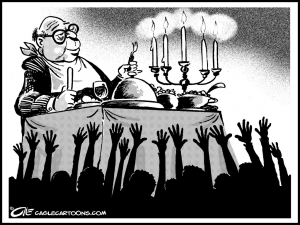By Dale Pierce
Raising taxes is a good idea after all. In fact, it is now quite necessary, according to former Romney flack and alleged deep thinker Greg Mankiw of Harvard University. (Whose introductory textbook in economics may go down in history as the single greatest disinformational success of all time.)
In this Sunday’s New York Times, Prof. Mankiw bravely challenges what he takes to be the newly prevailing group-think in Washington – namely, the bi-partisan idea that “taxes on the middle class must not rise.” This is “Bad Math”, we are told. This does not accord with the “laws of arithmetic” – at least not as Prof. Mankiw understands them. It is, he concludes, our government’s stubborn reluctance to tax the non-rich which explains why “the political process has become so dysfunctional.”
Continue reading →


 Rational public debate about the economy and government’s role in the economy is currently in extremely short supply. In a
Rational public debate about the economy and government’s role in the economy is currently in extremely short supply. In a 








